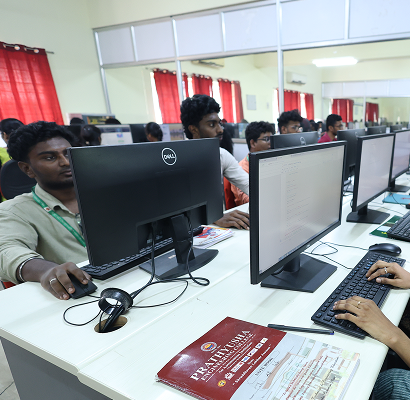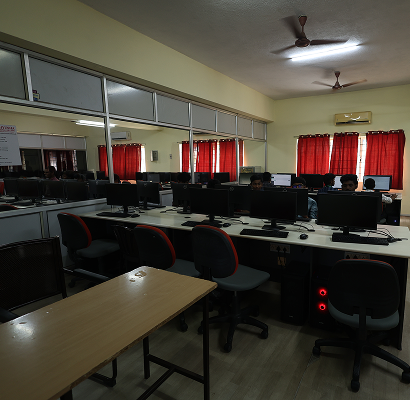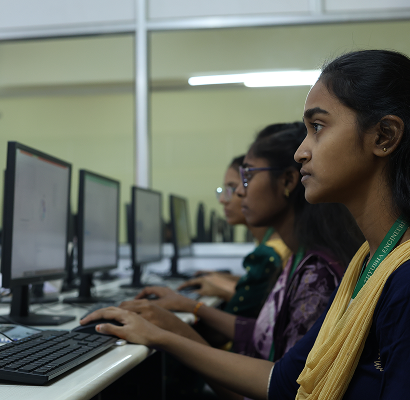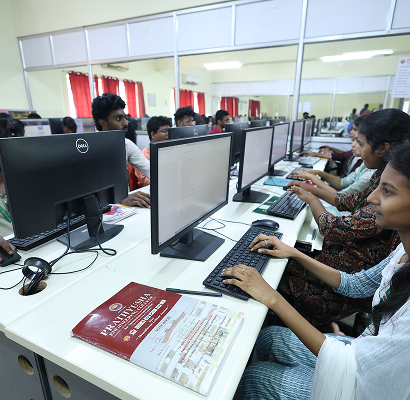- Result : 2024-25 (ODD) Percentage : 82%
- Result : 2023-24 Percentage : 91.49%
- Result : 2022-23 Percentage : 70.00%
- Result : 2021-22 Percentage : 89.20%
- Result : 2020-21 Percentage : 90.35%
- Result : 2024-25 (ODD) Percentage : 82%
- Result : 2023-24 Percentage : 91.49%
- Result : 2022-23 Percentage : 70.00%
- Result : 2021-22 Percentage : 89.20%
- Result : 2020-21 Percentage : 90.35%
About The Department
B.Tech in Artificial Intelligence & Data Science (AI and DS) is a 4-year degree program, aims to prepare students with the skills to perform intelligent data analysis in numerous real-world applications. Since the last decade, AI and DS witnessed tremendous growth and dramatic breakthroughs innovations applied in almost every sector. Artificial Intelligence is a wide-ranging branch of computer science, concerned with building smart/intelligent systems capable of performing tasks that typically require human intelligence. Data Science comprises various statistical techniques, involves pre-processing, analyzing, visualization data, and generating insights from it. Data Science is a field that makes use of AI to generate predictions but also focuses on transforming data for analysis and visualizations. This B.Tech programme is a perfect blend of AI and DS. It has comprehensive coverage of fundamentals of computer engineering, along with cross-disciplinary skills like statistics, mathematical and logical reasoning, knowledge discovery, AI Techniques, Machine Learning, visualization, big data analytics etc. With the advent of the Artificial Intelligence & Data Science degree programme, Students have transformed into industry-ready professionals by building smart machines with cutting-edge technologies.
Graduates of this programme will have career opportunities in healthcare, business management, e-commerce, social networking companies, climatology, biotechnology, genetics, and other important areas. The role of the graduates in these domains includes Data Scientist, Machine Learning Engineer, Data Analyst, Social Scientist, AI Developer, Business Intelligence Developer, Expert Analyst, and Decision Maker/Statistician.
Vision & Mission
Vision
- To strive for Global Recognition through Research, Innovation and Excellence in imparting Quality Education to provide face lift to the students as solution providers to the modern society.
Mission
- To imbibe the skills of simulating human intelligence in the students and to equip them with interdisciplinary skills using modern pedagogy.
- To build digital learning content in the realm of AI&DS under pinning the theories of cognitive science.
- To help learners to develop competency in algorithmic approaches in resolving complexities of real time problems.
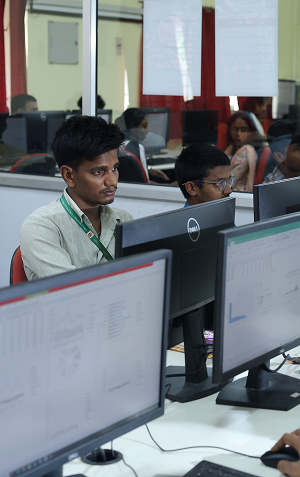
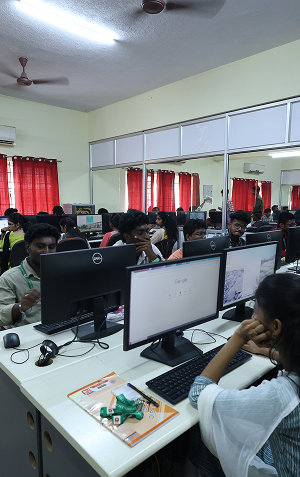
PO,PEO,POS
Programme Outcomes (POs)
- Engineering Knowledge: Apply knowledge of mathematics, natural science, computing, engineering fundamentals and an engineering specialization as specified in WK1 to WK4 respectively to develop to the solution of complex engineering problems.
- Problem Analysis: Identify, formulate, review research literature and analyze complex engineering problems reaching substantiated conclusions with consideration for sustainable development. (WK1 to WK4)
- Design/Development of Solutions: Design creative solutions for complex engineering problems and design/develop systems/components/processes to meet identified needs with consideration for the public health and safety, whole-life cost, net zero carbon, culture, society and environment as required. (WK5)
- Conduct Investigations of Complex Problems: Conduct investigations of complex engineering problems using research-based knowledge including design of experiments, modelling, analysis & interpretation of data to provide valid conclusions. (WK8).
- Engineering Tool Usage: Create, select and apply appropriate techniques, resources and modern engineering & IT tools, including prediction and modelling recognizing their limitations to solve complex engineering problems. (WK2 and WK6)
- The Engineer and The World: Analyze and evaluate societal and environmental aspects while solving complex engineering problems for its impact on sustainability with reference to economy, health, safety, legal framework, culture and environment. (WK1, WK5, and WK7).
- Ethics: Apply ethical principles and commit to professional ethics, human values, diversity and inclusion; adhere to national & international laws. (WK9)
- Individual and Collaborative Team work: Function effectively as an individual, and as a member or leader in diverse/multi-disciplinary teams.
- Communication: Communicate effectively and inclusively within the engineering community and society at large, such as being able to comprehend and write effective reports and design documentation, make effective presentations considering cultural, language, and learning differences
- Project Management and Finance: Apply knowledge and understanding of engineering management principles and economic decision-making and apply these to one’s own work, as a member and leader in a team, and to manage projects and in multidisciplinary environments.
Life-Long Learning: Recognize the need for, and have the preparation and ability for (i) independent and life-long learning (ii) adaptability to new and emerging technologies and (iii) critical thinking in the broadest context of technological change. (WK8).
Programme Educational Objectives (PEOs)
- PEO-1: To equip and enhance the proficiency of Graduates and thus encourage them to utilize the fundamental knowledge of basic sciences, mathematics, Artificial Intelligence, Data Science and Statics to build systems that require management and analysis of large volume of data.
- PEO-2: To invite the graduates with required technical skills to enable them pursue pioneering research in the field of Artificial Intelligence and Data Science and thus create disruptive and sustainable solutions for the welfare of Eco System.
- PEO-3: To inspire the graduates to think logically and help them to pursue lifelong learning and collaborate with an ethical attitude in a multi-disciplinary team.
Programme Specific Objectives (PSO’s)
- PSO1: Graduates would be able to evolve Artificial Intelligence based efficient domain specific process for effective and purposeful decision making in various domains including business and governments.
- PSO2: Graduates should be able to solve business and engineering problems with foresight and insight from available data within the resources.
- PSO3: The application of theoretical knowledge of Artificial Intelligence and data analysis packed with industrial tools and techniques should be able to help the graduates to solve the day-to-day problems emerging out of the social evils.
Achievements

Shri M. Gowtham and Shri K.S. Anupam Krishna
Final year students who ranked among the top 30 and reached the finals in the Flipkart GRiD Robotics Challenge 5.0 – 2024. Competing against 10,000 teams, they developed an autonomous pick-and-place arm with reorientation capabilities, leveraging computer vision, deep learning, and robotics.

S. Aswin Kumar
A first-year student who won second place in the 10th South Zone Senior National Atya Patya Championship organised by the Karnataka Arya Patya Association on February 24-25, 2024.

Shri Arsath Khan, Shri M. Gowtham, and Shri K.S. Anupam Krishna
Final-year students who reached the finals in the Flipkart GRiD 4.0 – Robotics – 2023 challenge. They built an autonomous warehouse delivery drone utilising computer vision and AI.

Mr. Rajendra
A first-year student who secured 90% and achieved Elite + Gold Certification in the Swayam – NPTEL course “The Joy of Computing using Python” from January to April 2023.

Bharath V
A second-year student who secured 85% and achieved Elite Silver Certification in the Swayam – NPTEL course “The Joy of Computing using Python” from January to April 2023.

P. Nandakishore
Winner of the first prize in the 4 x 400m relay, decathlon, second place in the 800m sprint, and third place in the javelin throw at the Anna University Zonal Level Athletics, held at GRT College of Engineering on November 26, 2023.

Yuvaraj P
A final-year student who secured Elite Silver Certification and was ranked among the top 5% in the Swayam – NPTEL course titled “Cloud Computing” from January to April 2023.

Jebastin P
A third-year student who secured second place in the “Workshop and Deep-A-Thon on Applications of CNN towards Health Care Precision” organized by the School of Computer Science and Engineering (SCOPE) at Vellore Institute of Technology, Chennai from April 11-13, 2024.

Mr. Anupam Krishna K.S
A third-year student who reached the finals in Hackcidents (IITM, RNTBC) – 2023, a national event aimed at reducing accidents in India. His team developed a retrofittable obstacle detection system using monocular depth estimation and a V2V communication network sponsored by Renault Nissan.

S. Aswin Kumar
A first-year student who won second place in the 17th Boys & Girls Junior Atya Patya State Championship 2023-2024, organized by the Thoothukudi District Atya Patya Association from October 27-29, 2023.

Arsath Khan A
A second-year student who won second prize and received ₹2,000 in the Mr. Tamil Nadu (Men’s Physique) competition held in Walajapet on July 3, 2022.

S.R. Sharun
Winner of the first prize in the 200m sprint and 4 x 100m relay at the Anna University Zonal Level Athletics, held at GRT College of Engineering on November 26, 2023.

Mr. Anupam Krishna K.S. & Team
Second-year students who secured first place in the Smart India Hackathon 2022 Hardware Edition for their project on median accident avoidance, sponsored by Volvo. Their project involved an obstacle detection and emergency car control system using stereo vision-based depth estimation, winning a prize of ₹50,000.
Your Pathway to Growth
| Semester | Course Code | Course Title | Study Material |
|---|---|---|---|
I | GE3151 | Problem Solving and Python Programming | |
II | CS3251 | Programming in C | |
III | CS3352 CS3301 CS3391 | Foundations of Data Science Data Structures Object Oriented Programming | |
IV | CS3491 CS3492 CS3401 CS3451 | Artificial Intelligence and Machine Learning Database Management Systems Algorithms Introduction to Operating Systems | |
V | CS3591 CS3501 CB3491 CS3551 CCS375 | Computer Networks Compiler Design Cryptography and Cyber Security Distributed Computing Web Technologies | |
| Course Code | Course Title | Study Material |
|---|---|---|
GE3171 | Problem Solving and Python Programming Laboratory | |
CS3271 | Programming in C Laboratory | |
CS3381 | Object Oriented Programming Laboratory | |
C S3361 | Data Science Laboratory | |
CS3461 | Operating Systems Laboratory | |
CS3491 | Artificial Intelligence and Machine Learning | |
C S3401 | Algorithms | |
CS3481 | Database Management Systems Laboratory | |
C S3591 | Computer Networks | |
C S3501 | Compiler Design | |
CCS349 | Image and video Analysis | |
CCS375 | Web Technologies | |
Faculty
Ms. R. Kannamma
Assistant Professor & HoD
Dr. Doreen Hephzibah Miriam D
Professor
Dr. C. Srivenkateswaran
Professor
Ms. C. Kamatchi
Assistant Professor
Ms.R.Anitha
Assistant Professor
Ms.D.Banupriya
Assistant Professor
Ms.U.Jothilakshmi
Assistant Professor
Ms.V.Asha
Assistant Professor
Mr.B.B.Senthil Kumar
Assistant Professor
Mrs. G. Geetha
Assistant Professor
Mrs. A. Jeyashree
Assistant Professor
Ms. P. Sivaganga
Assistant Professor
Mr. Kondareddy Thirumalakondaiah
Assistant Professor
Mrs. Naga Sowjanya
Assistant Professor
Ms. P. Deepa
Assistant Professor
Ms. Jayalakshmi. G
Assistant Professor
Mr. Muthukrishnan. P
Assistant Professor
Ms. Thilagavathy. V
Assistant Professor
Mr. Vijayakumar. J
Assistant Professor
Ms. Beulah Elizabeth D
Assistant Professor


